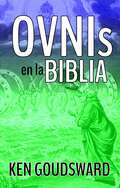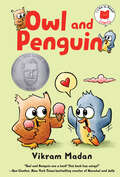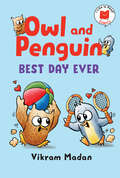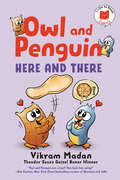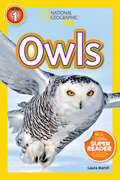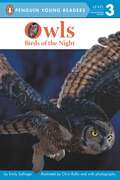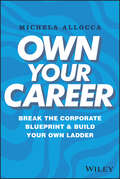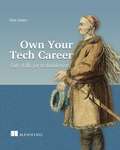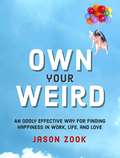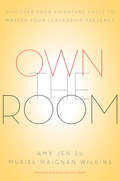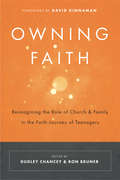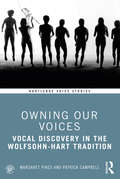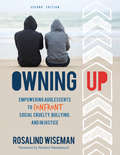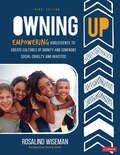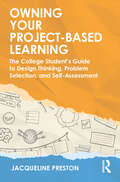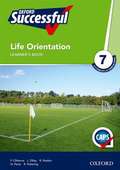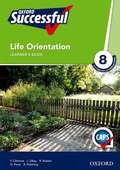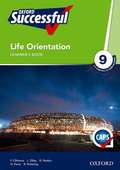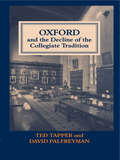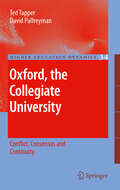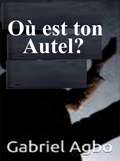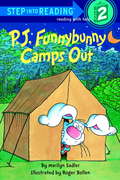- Table View
- List View
Ovnis en la Biblia
by Ken GoudswardEn 1968, Erich Von Daniken abrió una puerta por la que millones de curiosos han mirado con asombro y posiblemente algo de desconcierto. Ahora, de pie sobre los hombros de ese gigante, Ken Goudsward abre la puerta de par en par en este asombroso nuevo examen de las Escrituras, utilizando una exégesis hebrea sin precedentes para revelar no menos de 30 encuentros extraterrestres dentro de las páginas del libro más vendido. de todos los tiempos. En un momento de encrucijada entre la divulgación y la conspiración, la Biblia nunca ha sido más relevante.
Owl and Penguin (I Like to Read Comics)
by Vikram MadanTwo feathered friends are Frog and Toad for the emoji generation in this delightful graphic novel for emerging readers. <p><p>Owl likes peace and quiet. Penguin likes to SING OUT LOUD. But best friends don’t need to be the same. Sometimes it’s good to disagree! <p><p>Owl and Penguin celebrate their differences and solve their problems with creative play. From ice cream mishaps to rainy day chills, there’s nothing these pals can’t get through together. <p><p>In three nearly wordless stories, expressive art takes charge of the storytelling, supplemented by simple text captions and emoticon-style images in speech bubbles. This innovative format supports visual literacy and sight word recognition for the earliest independent readers. With warm humor and a joyful palette, it’s perfect for kids to giggle over on their own. <p><p>I Like to Read® Comics are perfect for kids who are challenged by or unengaged in reading, kids who love art, and the growing number of young comics fans. Filled with eye-catching art, humor, and terrific stories, these comics provide unique reading experiences for growing minds. Like their award-winning I Like to Read® counterparts, these books are created by celebrated artists and support reading comprehension to transform children into lifelong readers. A Junior Library Guild Gold Standard Selection. <P><P><i>Advisory: Bookshare has learned that this book offers only partial accessibility. We have kept it in the collection because it is useful for some of our members. Benetech is actively working on projects to improve accessibility issues such as these.</i>
Owl and Penguin: Best Day Ever (I Like to Read Comics)
by Vikram MadanTwo feathered friends are Frog and Toad for the emoji generation in this delightful graphic novel series for emerging readers.Owl wants to play catch. But Penguin wants to play tennis! Which should they play? Sometimes best friends disagree. Though Owl and Penguin are opposites, they like to solve their conflicts with creative play. From conquering fears to flying a runaway kite, there&’s nothing these pals can&’t get through together.In five nearly wordless stories, expressive art leads the storytelling, supplemented by simple text captions and emoticon-style images in speech bubbles. This innovative format supports visual literacy and sight word recognition for the earliest independent readers. With warm humor and a joyful palette, it&’s perfect for kids to giggle over on their own.I Like to Read® Comics are perfect for kids who are challenged by or unengaged in reading, kids who love art, and the growing number of young comics fans. Filled with eye-catching art, humor, and terrific stories, these comics provide unique reading experiences for growing minds. Like their award-winning I Like to Read® counterparts, these books are created by celebrated artists and support reading comprehension to transform children into lifelong readers.A Junior Library Guild Gold Standard Selection
Owl and Penguin: Here and There (I Like to Read Comics)
by Vikram MadanTwo feathered friends are Frog and Toad for the emoji generation in this delightful graphic novel series for emerging readers by a Theodor Seuss Geisel Honor winner.Owl and Penguin want to make a pizza. But they can&’t agree on how to toss the dough. Owl can do it better . . . no, Penguin can do it best! Hmmm, maybe they should just get takeout.Sometimes friends disagree. Though Owl and Penguin are opposites, they like to solve their conflicts with creative play. From making snow creatures to hiking a mountain, there&’s nothing these pals can&’t get through together. In three nearly wordless stories, expressive art leads the storytelling, supplemented by simple text captions and emoticon-style images in speech bubbles. This innovative format supports visual literacy and sight word recognition for the earliest independent readers. With warm humor and a joyful palette, it&’s perfect for kids to giggle over on their own.I Like to Read® Comics are perfect for kids who are challenged by or unengaged in reading, kids who love art, and the growing number of young comics fans. Filled with eye-catching art, humor, and terrific stories, these comics provide unique reading experiences for growing minds. Like their award-winning I Like to Read® counterparts, these books are created by celebrated artists and support reading comprehension to transform children into lifelong readers.A Junior Library Guild Gold Standard Selection
Owl at Home (I Can Read Level 2)
by Arnold LobelWelcome to Owl's Cozy home in this classic Arnold Lobel I Can Read! Owl lives by himself in a warm little house. But whether Owl is inviting Winter in on a snowy night or welcoming a new friend he meets while on a stroll, Owl always has room for visitors!Arnold Lobel's beloved Level 2 I Can Read classic was created for kids who read on their own but still need a little help. Whether shared at home or in a classroom, the engaging stories, longer sentences, and language play of Level Two books are proven to help kids take their next steps toward reading success.The classic Frog and Toad stories by Arnold Lobel have won numerous awards and honors, including a Newbery Honor, a Caldecott Honor, ALA Notable Children’s Book, Fanfare Honor List (Horn Book), School Library Journal Best Children’s Book, and Library of Congress Children’s Book.
Owls (Readers)
by Laura MarshIn this level 1 reader, young readers will explore the feathery world of adorable owls. Follow these curious-looking creatures through their wooded habitats, and learn how owls raise their young, hunt, and protect themselves. Beautiful photos and carefully leveled text make this book perfect for reading aloud or for independent reading.
Owls: Birds of the Night (Penguin Young Readers, Level 3)
by Emily SollingerDid you know that the biggest owl has a wingspan of five feet? That's big! The smallest owl is no bigger than an avocado. Filled with photographs and vivid illustrations, this book will teach you all about these beautiful birds.Excerpt:When the owlets are about one month old, they are ready to leave the nest.At first, owlets hop from branch to branch.They grab onto tree bark.They wander around on the ground.They practice flapping their wings.Look!They are flying!The owlets are now called fledglings(say: FLEJ-lings).
Own Your Career: Break the Corporate Blueprint and Build Your Own Ladder
by Michela AlloccaImbue your career with purpose and meaning In Own Your Career: Break the Corporate Blueprint and Build Your Own Ladder, popular financial analyst and entrepreneur Michela Allocca delivers an exciting new discussion of how to break the corporate blueprint and forge your own path to a fulfilling and rewarding career. You'll learn to find happiness and purpose at work, whether you're interested in climbing the corporate ladder or embarking on a different path. The book offers a collection of tactical strategies you can apply immediately within your career to start getting more out of your day job and redefine what success means to you. You'll find: Effective tactics for positioning yourself in your resume, articulating your skills in interviews, and negotiating your compensation to ensure you are not only landing the job, but that it's as lucrative as possible. Practical strategies to navigate career changes and make intentional career decisions with confidence. Systems to maximize your earning potential and build a successful side hustle you can take to the next level A can't-miss guide for young professionals, the newly graduated, and aspiring entrepreneurs, Own Your Career offers realistic advice to excel at work and take your professional power back, both inside and outside of the office.
Own Your Tech Career: Soft skills for technologists
by Don JonesOwn Your Tech Career: Soft skills for technologists is a guide to taking control of your professional life. It teaches you to approach your career with planning and purpose, always making active decisions towards your goals.Summary In Own Your Tech Career: Soft skills for technologists, you will: Define what &“success&” means for your career Discover personal branding and career maintenance Prepare for and conduct a tech job hunt Spot speed bumps and barriers that can derail your progress Learn how to navigate the rules of the business world Perform market analysis to keep your tech skills fresh and relevant Whatever your road to success, you&’ll benefit from the toolbox of career-boosting techniques you&’ll find in Own Your Tech Career: Soft skills for technologists. You&’ll discover in-demand communication and teamwork skills, essential rules for professionalism, tactics of the modern job hunt, and more. Purchase of the print book includes a free eBook in PDF, Kindle, and ePub formats from Manning Publications. About the technology A successful technology career demands more than just technical ability. Achieving your goals requires clear communication, top-notch time management, and a knack for navigating business needs. Master the &“soft skills,&” and you&’ll have a smoother path to success and satisfaction, however you define that for yourself. About the book Own Your Tech Career: Soft skills for technologists helps you get what you want out of your technology career. You&’ll start by defining your ambition—whether that&’s a salary, a job title, a flexible schedule, or something else. Once you know where you&’re going, this book&’s adaptable advice guides your journey. You&’ll learn conflict resolution and teamwork, master nine rules of professionalism, and build the confidence and skill you need to stay on the path you&’ve set for yourself. What's inside Personal branding and career maintenance Barriers that derail progress The rules of the business world Market analysis to keep tech skills fresh About the reader For tech professionals who want to take control of their career. About the author Microsoft MVP Don Jones brings his years of experience as a successful IT trainer to this engaging guide. Table of Contents 1 Own your career 2 Build and maintain your brand 3 Network 4 Be part of a technology community 5 Keep your tech skills fresh and relevant 6 Show up as a professional 7 Manage your time 8 Handle remote work 9 Be a team player 10 Be a team leade 11 Solve problems 12 Conquer written communications 13 Conquer verbal communications 14 Resolve conflicts 15 Be a data-driven, critical thinker 16 Understand how businesses work 17 Be a better decision-maker 18 Help others 19 Be prepared for anything 20 Business math and terminology for technologists 21 Tools for the modern job hunt
Own Your Weird: An Oddly Effective Way for Finding Happiness in Work, Life, and Love
by Jason ZookTired of all the "shoulds" that guide your life? Want to create a life full of meaning? Work on your own terms? See the world a little differently? Then it's time to Own Your Weird. Creative entrepreneur Jason Zook certainly walks the walk of "owning his weird." He's had some crazy yet successful schemes -- he's made over a million dollars by having more than 1,600 companies pay him to wear their t-shirt (a project called I WearYour Shirt). Later he auctioned off his last name twice, for $50K each time. He then self-published his first book Creativity for Sale by nabbing sponsors and generating $75K in revenue. Now Own Your Weird is targeted to other potential "out of the box" thinkers who dream not only of doing work on their own terms, but also creating a meaningful life. Consider Jason your spirit guide, offering strategies for honing in on what makes you weird, recognizing when feedback is just another form of procrastination, and how to stop with social media already. There's a specific set of strategies and exercises that can help you prioritize your life over your business, by identifying your MMM (Minimum Monthly Magic) number. He also offers examples from his own life (how he got out of $124K worth of debt, escaped the pressure to have a big wedding, and has thrived on social media by primarily ignoring it). Own Your Weird is the permission slip you need to take that big risk. To finally chase down that big idea. And to let go of "supposed to" thoughts. See how life opens up when you break out of the blueprint.
Own the Room
by Amy Jen Su Muriel Maignan WilkinsFind your signature voicePeople are drawn to and influenced by leaders who communicate authentically, connect easily with people, and have immediate impact. So how do you become one of them? How can you learn to "own the room"? This book will help you develop your leadership presence. According to Amy Jen Su and Muriel Maignan Wilkins, leadership presence is the ability to consistently and clearly articulate your value proposition while influencing and connecting with others. They offer a simple and compelling framework, as well as practical advice about how you can develop your own personal presence.No matter where you sit in an organization, you can "own the room" if you are able to do two things well: first, demonstrate your authentic value and distinction, and second, connect to others in a positive way. Leaders who are able to be authentic while connecting with and impacting others have what the authors call a "signature voice"-a means of self-expression that is uniquely and distinctly their own. Once you discover and express your own signature voice, you'll be ready to take your leadership presence to the next level.Filled with real-life stories and examples, Own the Room demystifies the concept of presence and gives you the tools you need to identify and embrace your unique leadership voice-and have a greater impact on the world around you.
Owning Faith: Reimagining the Role of Church and Family in the Faith Journey of Teenagers
by Ron Bruner Dudley ChanceyMore than ever, young disciples want relationships with their parents and other adults; Owning Faith helps older disciples understand how to honor and nurture relationships that last a lifetime.Today’s adolescents face an uphill climb as they seek to own their faith. And while it’s easy to think that what they really need is an expert, Owning Faith lets you in on God’s big secret: what they need more than anything else is you.Owning Faith is an accessible guide into the adventure-filled spiritual journey of adolescents. If you would like to learn how to be a wise and compassionate companion who can make an eternal difference in the lives of youth, Owning Faith will show you how.
Owning Our Voices: Vocal Discovery in the Wolfsohn-Hart Tradition (Routledge Voice Studies)
by Patrick Campbell Margaret PikesOwning Our Voices offers a unique, first-hand account of working within the Wolfsohn-Hart tradition of extended voice work by Margaret Pikes, an acclaimed voice teacher and founder member of the Roy Hart Theatre. This dynamic publication fuses Pikes’ personal account of her own vocal journey as a woman within this, at times, male-dominated tradition, alongside an overview of her particular pedagogical approach to voice work, and is accompanied by digital footage of Pikes at work in the studio with artist-collaborators and written descriptions of scenarios for teaching. For the first time, Margaret Pikes’ uniquely holistic approach to developing the expressive voice through sounding, speech, song and movement has been documented in text and on film, offering readers an introduction to both the philosophy and the practice of Wolfsohn-Hart voice work. Owning Our Voices is a vital book for scholars and students of voice studies and practitioners of vocal performance: it represents a synthesis of a life’s work exploring the expressive potential of the human voice, illuminating an important lineage of vocal training, which remains influential to this day.
Owning Up: Empowering Adolescents to Confront Social Cruelty, Bullying, and Injustice
by Ms Rosalind P. WisemanEmpower students to stand up for what matters Created in collaboration with children and teens, Owning Up helps young people identify and be critical of social issues in their lives—from bullying and harassment in the classroom to systems of power and oppression in the world around them. While there is no one-size-fits-all curriculum, Owning Up takes us leaps forward by: Designing sessions to be easily facilitated by a school counselor, teacher, leader, or other professional in small group settings Combining discussions, games, and role-playing to engage adolescents in the complexities of social culture Exploring critical topics such as media analysis, gender, sexual harassment, racism, gossip, and self-image
Owning Up: Empowering Adolescents to Confront Social Cruelty, Bullying, and Injustice
by Ms Rosalind P. WisemanEmpower students to stand up for what matters Created in collaboration with children and teens, Owning Up helps young people identify and be critical of social issues in their lives—from bullying and harassment in the classroom to systems of power and oppression in the world around them. While there is no one-size-fits-all curriculum, Owning Up takes us leaps forward by: Designing sessions to be easily facilitated by a school counselor, teacher, leader, or other professional in small group settings Combining discussions, games, and role-playing to engage adolescents in the complexities of social culture Exploring critical topics such as media analysis, gender, sexual harassment, racism, gossip, and self-image
Owning Up: Empowering Adolescents to Create Cultures of Dignity and Confront Social Cruelty and Injustice
by Rosalind WisemanFoster dignity and respect and combat youth aggression As middle school students adjust to tougher academics, they also find themselves introduced to increasingly complex social situations—including conflicts on social media, racism, anxiety, and bullying—and the choices they make can have repercussions far beyond the classroom. But they are not alone. This new edition from bestselling author and Cultures of Dignity co-founder Rosalind Wiseman is packed with the latest research-based strategies, reviewed by high school and middle school students and revised to include all that she has learned while working over decades with young people. Owning Up has helped teachers, counselors, and leaders give students the tools they need to own up and take responsibility—as perpetrators, bystanders, and targets—for unethical behavior and to treat themselves and others with dignity. This bigger, comprehensive edition features: · Three flexible, dynamic curricula separated by grade · A new chapter on successfully implementing a social and emotional learning program in every school · More games, role-playing activities, and provocative discussion questions to use in co-ed or single-sex groups · Even more lessons and resources, updated to address social media, bystanding, and how young people can develop strong, healthy relationships with adults Designed for use both in school and out, Owning Up helps prevent many of the common issues young people face and promotes friendships in these critical years. As educators, we must enlist the people who can make a real difference: the students.
Owning Up: Empowering Adolescents to Create Cultures of Dignity and Confront Social Cruelty and Injustice
by Rosalind WisemanFoster dignity and respect and combat youth aggression As middle school students adjust to tougher academics, they also find themselves introduced to increasingly complex social situations—including conflicts on social media, racism, anxiety, and bullying—and the choices they make can have repercussions far beyond the classroom. But they are not alone. This new edition from bestselling author and Cultures of Dignity co-founder Rosalind Wiseman is packed with the latest research-based strategies, reviewed by high school and middle school students and revised to include all that she has learned while working over decades with young people. Owning Up has helped teachers, counselors, and leaders give students the tools they need to own up and take responsibility—as perpetrators, bystanders, and targets—for unethical behavior and to treat themselves and others with dignity. This bigger, comprehensive edition features: · Three flexible, dynamic curricula separated by grade · A new chapter on successfully implementing a social and emotional learning program in every school · More games, role-playing activities, and provocative discussion questions to use in co-ed or single-sex groups · Even more lessons and resources, updated to address social media, bystanding, and how young people can develop strong, healthy relationships with adults Designed for use both in school and out, Owning Up helps prevent many of the common issues young people face and promotes friendships in these critical years. As educators, we must enlist the people who can make a real difference: the students.
Owning Your Project-Based Learning: The College Student’s Guide to Design Thinking, Problem Selection, and Self-Assessment
by Jacqueline PrestonOwning Your Project-Based Learning is a user-friendly, vividly illustrated guide designed to help undergraduate students and their instructors fully realize the power of project-based learning (PBL). This book complements a wide range of discipline-specific materials, guiding college students to identify topics of interest, conduct thorough research, and tackle real-world problems through thoughtfully designed projects. It is an indispensable resource for undergraduate instructors, enabling them to focus on content while providing students with the necessary tools to collaborate with community partners and effectively manage project development. Whether assigned by a professor or developed with teams or community partners, PBL offers enriching, hands-on educational experiences across various disciplines. As the demand for PBL at the undergraduate level increases, this essential guide addresses college-specific needs – from the academic research process to the critical roles of distribution, publication, and multimedia in career readiness – ensuring comprehensive support for both students and faculty.
Oxford Successful Life Orientation Learner's Book 7: UBC contracted
by R. Naidoo F. Clitheroe L. Dilley N. Perez R. PickeringOxford Successful Life Orientation is a CAPS-aligned course used by teachers all over South Africa. Teachers trust its rich content and comprehensive guidance for Life Orientation. Once teachers and learners have used Oxford Successful, it remains their choice for classroom success. Teachers use Oxford Successful because: • excellent planning that allows for different teaching and learning styles, and creative lessons • careful pacing that ensures the curriculum can be completed in the allocated time • accessible language that helps learners to acquire new concepts and to deepen their understanding of concepts learnt previously • language support for learners at this phase, including a focus on words used in tests and exams, and difficult words • careful progression of skills and concepts that allow learners to excel within the grade and the phase • rich content with a variety of activities for mixed-ability classes • classroom management guidance that helps them to structure their lessons according to their classroom needs • clear assessment guidance to prepare learners for formal examinations, tests and tasks • professional guidance for physical education teachers • the careful focus on career guidance and preparing learners for the world of work • graded activities which address all cognitive levels. Oxford Successful Life Orientation has the following components: • Learner's Book • Teacher's Guide What teachers say about Oxford Successful: "Oxford Successful provides consolidation … which prepares learners better for tests and exams."
Oxford Successful Life Orientation Learner's Book Grade 8: UBC contracted
by R. Naidoo F. Clitheroe L. Dilley N. Perez R. PickeringOxford Successful Life Orientation is a CAPS-aligned course used by teachers all over South Africa. Teachers trust its rich content and comprehensive guidance for Life Orientation. Once teachers and learners have used Oxford Successful Life Orientation, it remains their choice for classroom success.
Oxford Successful Life Orientation Learner's Book Grade 9: UBC contracted
by R. Naidoo F. Clitheroe L. Dilley N. Perez R. PickeringOXFORD SUCCESSFUL LIFE ORIENTATION GR 9 (LEARNERS BOOK) (CAPS)
Oxford and the Decline of the Collegiate Tradition
by David Palfreyman Ted TapperFor centuries, the idea of collegiality has been integral to the British understanding of higher education. This book examines how its values are being restructured in response to the 21st-century pressures of massification and managerialism.
Oxford, the Collegiate University
by David Palfreyman Ted TapperOxford is one of the world's great universities but this has not meant that it is exempt from pressures for change. On various fronts it has been required to meet the challenges that universities almost worldwide have to face. Given the retrenchment of public funding, especially to support undergraduate teaching, it has been required to augment its financial base, while at the same time deciding how to respond to pressure from successive governments determined to use higher education to achieve their own policy goals. While still consistently ranked as a world-class university, it has to decide how it is to acquire the funding to continue in this league, or whether this goal is worth pursuing. Oxford is a collegiate university, which means its colleges share with the University responsibility for the delivery of its central goals. Is this balance of authority shifting over time? If so, how is this to be accounted for, and what are the likely outcomes for the collegiate university? This book sets out to address these questions and arrives at an essentially positive conclusion. Oxford will continue to remain an effective collegiate university and, while its identity will change, its central character will persist.
Où est ton autel?
by Gabriel AgboUn autel est un lieu de sacrifice. C'est un lieu de culte. C'est là que les humains et les esprits se rencontrent régulièrement. Les demandes d'autel pour les sacrifices et les sacrifices attirent Dieu. Si vous voulez avoir une relation très cordiale avec Dieu, vous devez établir un autel et l'entretenir régulièrement par des sacrifices. Et je tiens pour acquis que vous savez que le sacrifice d'aujourd'hui n'est plus les animaux, les oiseaux, les bougies, l'encens, les céréales et les holocaustes, etc. mais nos vies consacrées à Dieu. Aujourd'hui, nous lui offrons un sacrifice odorant et agréable en vivant une vie sainte et dévouée. La vie que nous menons s'élève vers lui comme une saveur douce et odorante, comme une odeur agréable. Maintenant, je vous demande, vivez-vous comme un sacrifice pour lui - saint et dévoué ? Avez-vous un autel ? En avez-vous pour votre famille ? Où priez-vous ? Avez-vous un lieu et un temps qui lui sont consacrés ? Lui donnez-vous assez de louanges et d'adoration ? Savez-vous que le ciel vient vous attendre à votre heure et à votre lieu de culte habituels ? Et qu'en est-il des païens, des occultistes, des satanistes, ont-ils leurs propres autels ? Peuvent-ils nous affecter ? C'est un livre intéressant.
P. J. Funnybunny Camps Out (Step into Reading)
by Marilyn Sadler Roger BollenIllus. in full color. Camping is not for girls, right? At least, that's what P.J. and his pals tell Donna and Honey Bunny when they want to tag along on a camping trip. But when two mysterious ghosts frighten the boys all the way home, only the girls know the real story.
